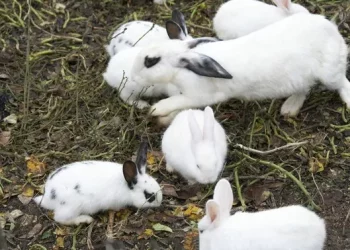Rabbits are delightful and unique pets that require a carefully balanced diet to stay healthy. As a responsible pet owner, it’s essential to know what and when to introduce various foods into your rabbit’s diet. One of the most common questions new rabbit owners ask is, “At what age can I start feeding my rabbit vegetables?”
Vegetables are a crucial part of a rabbit’s diet, providing necessary nutrients, fiber, and variety. However, introducing them at the right age and in the right manner is vital for your rabbit’s digestive health and overall well-being. This comprehensive guide will walk you through the appropriate age to introduce vegetables, how to do so safely, and which vegetables are best for your furry friend.
The Basics of Rabbit Nutrition
Before diving into the specifics of introducing vegetables, it’s important to understand the basics of rabbit nutrition.
Essential Diet Components
A rabbit’s diet should primarily consist of:
Hay: The cornerstone of a rabbit’s diet, hay provides essential fiber that aids digestion and helps prevent obesity. Timothy hay, meadow hay, and orchard grass are all excellent choices.
Pellets: High-quality rabbit pellets can complement hay, offering a concentrated source of essential vitamins and minerals.
Fresh Vegetables: Once introduced appropriately, vegetables offer variety and additional nutrients.
Fresh Water: Always ensure your rabbit has access to clean, fresh water.
Digestive System of Rabbits
Rabbits have a unique digestive system adapted for processing high-fiber diets. Their large cecum and colon play crucial roles in breaking down fiber and fermenting food. Because of this, introducing new foods needs to be done gradually to avoid digestive upset.
When to Introduce Vegetables to Your Rabbit
Introducing vegetables to your rabbit’s diet should be done at the appropriate age to ensure they can handle the new food without digestive issues.
Baby Rabbits (0-8 Weeks)
Baby rabbits, or kits, should not be given vegetables until they are at least 8 weeks old. During this time, they rely on their mother’s milk or a suitable milk replacer for nutrition. Their digestive systems are not mature enough to handle solid foods, including vegetables.
Weaning Stage (8-12 Weeks)
At around 8 weeks of age, you can start introducing small amounts of vegetables into your rabbit’s diet. However, this should be done gradually and in small quantities. Their digestive systems are still developing, so it’s important to introduce new foods slowly to prevent digestive upset.
How to Introduce Vegetables Safely
Introducing vegetables to your rabbit’s diet requires a thoughtful approach to ensure their health and safety.
Start with Small Amounts
Begin by offering a small piece of a single vegetable to see how your rabbit reacts. Watch for any signs of digestive distress, such as diarrhea or gas. If your rabbit tolerates the new food well, you can gradually increase the quantity.
Choose Safe Vegetables
Not all vegetables are suitable for rabbits. Some vegetables can cause digestive issues or are toxic to rabbits. Safe vegetables to introduce include:
Leafy Greens: Romaine lettuce, kale, cilantro, parsley.
Non-Starchy Vegetables: Carrots (in moderation), bell peppers, cucumber.
Herbs: Basil, mint, dill.
Avoid feeding your rabbit starchy vegetables like potatoes, and be cautious with high-oxalate vegetables like spinach and beet greens, which can contribute to urinary issues if fed in large quantities.
Monitor for Reactions
After introducing a new vegetable, monitor your rabbit’s behavior and digestive health. Look for signs of allergies or intolerance, such as changes in stool consistency or reduced appetite. If you notice any adverse reactions, remove the vegetable from their diet and consult your veterinarian.
Creating a Balanced Diet for Your Rabbit
A well-rounded diet is crucial for your rabbit’s health. Vegetables should complement, not replace, the primary components of their diet.
Balance with Hay and Pellets
Ensure that vegetables make up only a portion of your rabbit’s diet. Hay should still be the primary food source, with pellets serving as a supplement. Vegetables should be introduced as a treat or supplement to the main diet.
Variety and Moderation
Offer a variety of vegetables to provide different nutrients and prevent boredom. However, avoid overfeeding any single type of vegetable. Moderation is key to preventing digestive issues and ensuring a balanced intake of nutrients.
Adjusting Diet as Your Rabbit Grows
As your rabbit matures, their dietary needs will change. Continue to adjust the balance of hay, pellets, and vegetables to match their age, size, and health needs. Senior rabbits, for example, may require different nutritional adjustments compared to younger rabbits.
Common Mistakes and How to Avoid Them
Even experienced rabbit owners can make mistakes when introducing vegetables. Here are some common pitfalls and how to avoid them:
See Also: Can Rabbits Eat Bermuda Hay?
Introducing Too Many New Foods at Once
Introducing multiple new vegetables simultaneously can overwhelm your rabbit’s digestive system. Always introduce one new food at a time and wait several days before adding another. This approach helps identify any specific foods that may cause issues.
Feeding High-Sugar or Starchy Vegetables
High-sugar or starchy vegetables, such as sweet corn or peas, should be avoided. These can lead to obesity, digestive problems, or other health issues. Stick to low-sugar, high-fiber vegetables to ensure your rabbit’s diet remains healthy.
Ignoring Freshness and Cleanliness
Always ensure vegetables are fresh and thoroughly washed before offering them to your rabbit. Contaminants or pesticides can be harmful. Organic vegetables are a good option to minimize exposure to chemicals.
Signs of Digestive Issues and What to Do
Introducing vegetables can sometimes lead to digestive issues. Knowing the signs and what to do is important for your rabbit’s health.
Symptoms of Digestive Distress
Signs that your rabbit may be experiencing digestive problems include:
- Diarrhea or soft stools
- Gas or bloating
- Reduced appetite
- Lethargy
If you notice any of these symptoms, remove the new vegetable from their diet and consult your veterinarian promptly.
Preventing Digestive Issues
To prevent digestive problems, introduce vegetables slowly and in small amounts. Ensure a consistent supply of high-quality hay, as this is crucial for healthy digestion. Regular veterinary check-ups can help monitor your rabbit’s overall health and address any dietary concerns.
Conclusion
Introducing vegetables into your rabbit’s diet is an important step in providing a balanced and varied diet. By waiting until your rabbit is at least 8 weeks old, introducing vegetables gradually, and monitoring their health, you can ensure a smooth transition to a more diverse diet.
Remember, the key to a healthy rabbit diet is balance. Vegetables should complement, not replace, hay and pellets. By making informed choices and paying attention to your rabbit’s individual needs, you can help ensure they enjoy a long, healthy, and happy life.
Whether you’re a new rabbit owner or looking to refine your pet care routine, understanding and managing your rabbit’s diet will lead to a more fulfilling relationship with your furry friend.
Related Topics:

























